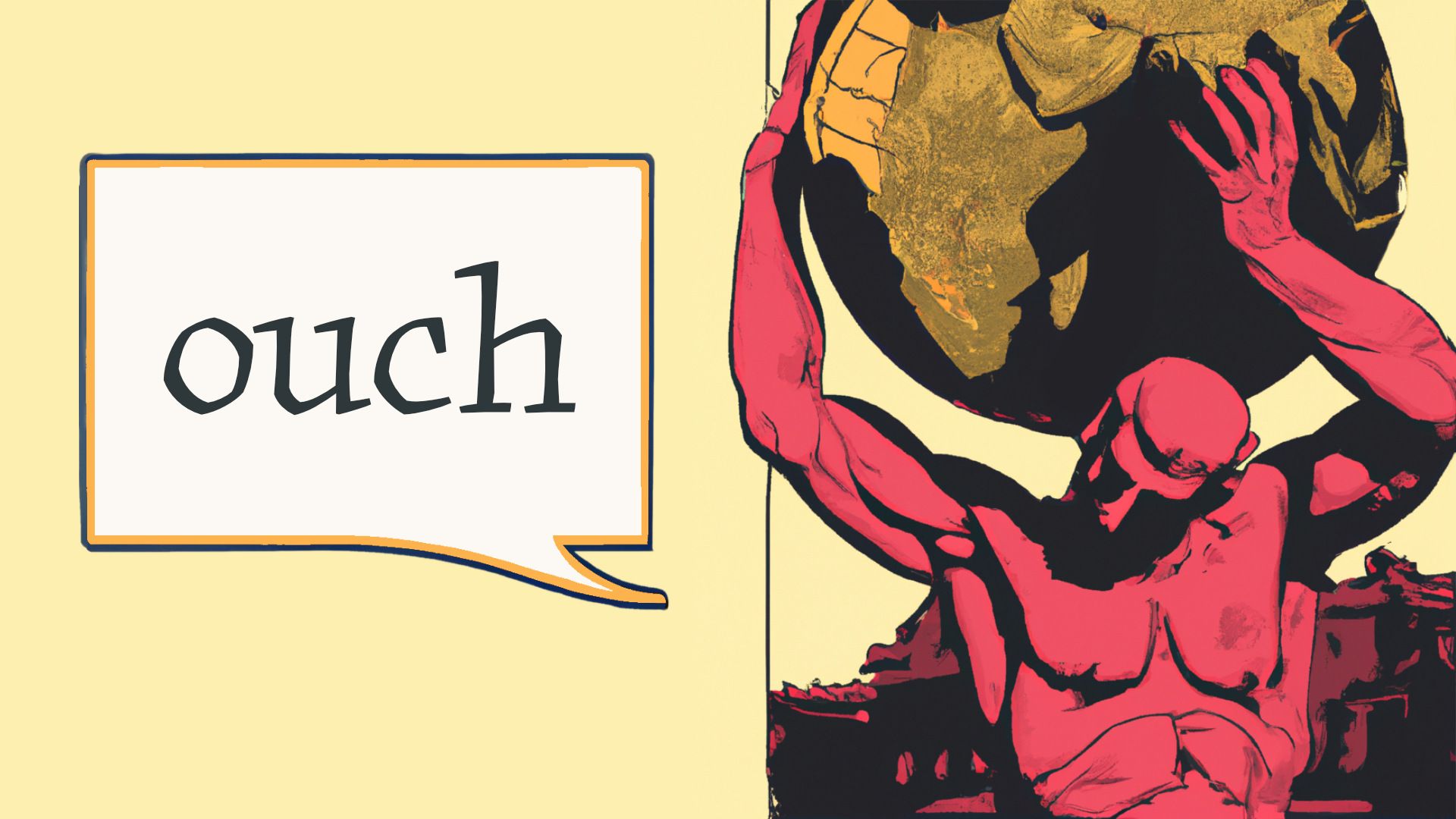Atlas Winced: Starting A Company is Harder Than You Think
Pain is inevitable as a founder. Learning how to deal with it can be the difference between success and failure.

Starting a company is harder than you think. It’s rewarding too, especially for the obsessively driven founders who tend to survive and succeed. But it’s absurdly hard. Most first-time founders are unprepared for the deeply personal nature of the startup struggle, and many current founders don’t know how to read the pain signals those struggles produce. You may aspire to be Atlas, but even titans suffer.
I have experienced these tribulations from every angle—as an early employee at a breakout company, as a founder of my own, and as an investor/advisor to hundreds more. Below are key tactics for surviving the early–stage startup gauntlet.
The Question that Will Haunt You Most
The single hardest question for a founder at the pre-seed and seed stage is whether to persist with the current product or move on to the next idea.
So much of the mythology of Silicon Valley valorizes persistence and grit—while at the same time preaching the value of failing fast. Iterating, but also persevering.
Giving up feels personal, like a judgment on your own fortitude and right to call yourself a founder. After all, Silicon Valley is full of triumphal stories of founders who stuck it out when everyone told them to pivot. It's a heavy decision.
But digging in can feel like a trap, like taking refuge in the sunk cost fallacy. After all, Silicon Valley is full of celebrated stories of founders who smartly pivoted into success.
So, how do you tell the difference between a bad idea, bad execution, and insufficient patience? That is ultimately the (t)(b)million dollar question.
Below are some heuristics that I have learnt over the years at South Park Commons, Facebook, and my own startup. These five questions should help clarify your thoughts and hopefully put you on the path to conviction.
- Are you waking up with motivation and energy to tackle the problem you set out to solve? Note that this doesn't mean that it has to be fun. It will likely be the opposite. It will feel like a slog. But you must continue to feel a deep sense of motivation. The struggle should energize you, not leave you feeling drained.
- Are you feeling creative when thinking about the problem space? If you are at a dead end, then go take some time off. If you are still feeling blocked after that, then it is time to move on.
- Are you learning something new about the problem space on a regular basis? It's critical that your understanding of the domain regularly compounds. If you are stuck in a particular point in the solution-understanding space, then it is unlikely that you are going to be able to come up with wild ideas to create something amazing.
- Is your confidence in the idea greater than it was six months ago? I use six months as the marker because it allows you to control for the temporary ups and downs inherent in any startup. But if you are really feeling lower confidence than half a year ago, then move on to something else.
- What are your smartest friends telling you about the product/idea? You don't have to listen to them, but it's pretty useful input to poll the smartest people you know about what you are working on (this is actually where having a community like SPC is tremendously helpful).
Lastly, trust your instincts. Don't force yourself to do something that doesn't feel right. There’s a strong tendency among technical builders and founders to over-intellectualize and ignore intuitive signals. Learning to read those signals and incorporate them into your decision making is critical.
The Potential of Pain
The signal you need to get most comfortable with as a founder is pain. There's no avoiding it, especially in the early days. Building your company is going to hurt.
But like any signal, pain is useful. The key to using it is being able to distinguish between good pain and bad pain.
GOOD pain is:
- Feeling exhausted after a long day's work
- Feeling like your inbox is never empty
- Feeling like you don't have enough hours in the day to put out every fire
- Feeling the exhilaration and emotional intensity of the ride
If you're NOT feeling these kinds of pain, you are not moving fast enough. These are the burdens of urgency and execution.
BAD pain is:
- Feeling dread when you wake up in the morning
- Feeling like you are alone in the journey
- Feeling like you are phoning it in
- Feeling like you know something is wrong but don't know what to do about it
- When the area under the curve feels like lethargy as opposed to energy
These are signals that you don't care as much about the problem and solution as a startup demands. You don't have founder-market fit. Or that you haven't built the right team that can band together and survive the gauntlet. Or that you have truly hit one of the dead ends discussed above.
One reason we preach the -1 to 0 idea at SPC is that taking the pre-launch stage seriously prepares founders for the pains they will face. If you want more of the good and less of the bad, take your time to reach founder-market fit, find the right people to go through hell with, and effectively validate your ideas.
Nowadays, that last point is especially important.
Being Right vs. Being First
With the technology ecosystem moving faster than ever before, being first is a fool's errand. It's much more leveraged to focus on being right.
Just take a look at how fast ideas/companies/products are evolving in AI. This isn't surprising given how much more connected the technology ecosystem is. Add in genuine technological advances and a once-in-a-generation platform shift, and the effects can be dizzying. Think of the market maps you see coming out of the big venture capital firms—there are often 10+ companies for any small part of the grid.
With this kind of pace—and, importantly, how much people talk about it—it's easy to feel like you are already behind. Someone has made a little more progress on the idea. Someone has raised more capital. Someone got there first.
In this world, a more differentiated strategy is to focus on being right. On iterating until you feel like you have something substantive. Maybe even building out something that tackles more than just one point feature. Build out something much more fleshed out.
Two aspects to this strategy worth emphasizing:
- Take the time to find an approach to the problem that is really resonant with users and solves a pain point. Take multiple tries at it till you feel you have it right. Importantly, don't worry if this takes time and puts you "further behind."
- Once you have that initial approach, take the time to build out a more fully fleshed out solution than you think necessary. This is heretical to the last decade of lean-startup thinking but I think important in the future.
The above points don't mean giving up urgency. Being methodical doesn’t mean being slow. The point is to not over-index on being first. To build the right approach and the right product and not launch just to launch. This is an important difference.
Another way of putting this is to invest more time in -1 to 0. Build more conviction before you launch, because once you're in 0 to 1 the imperative of speed kicks in. Being right is an accelerant, while being wrong means all kinds of bad pain. So go slow to go fast.
Even Atlas must have winced when he first shouldered his burden. Building something as ambitious as a venture-scale company will test your limits. Especially early on, when there's much less objective data to indicate what's working, founders need to read the signals they have access to. Learn how to interpret what your body is telling you, ask brutally honest questions of yourself and your team, and, if you haven't yet launched, put more time into -1 to 0 to better prepare for what's ahead.
